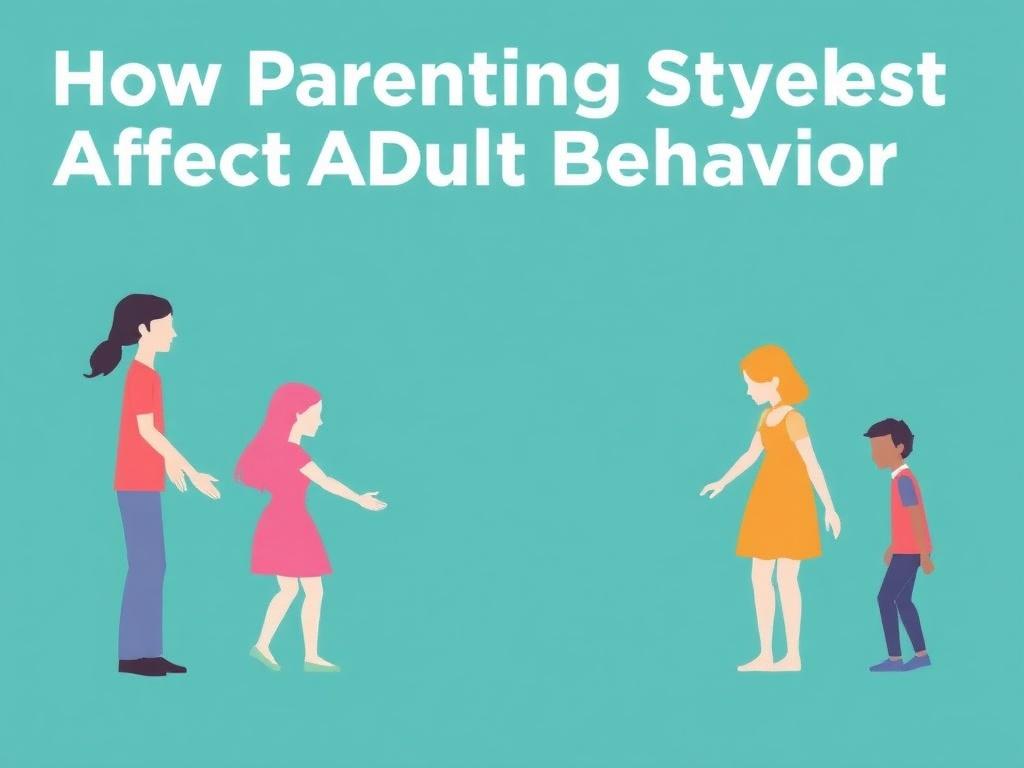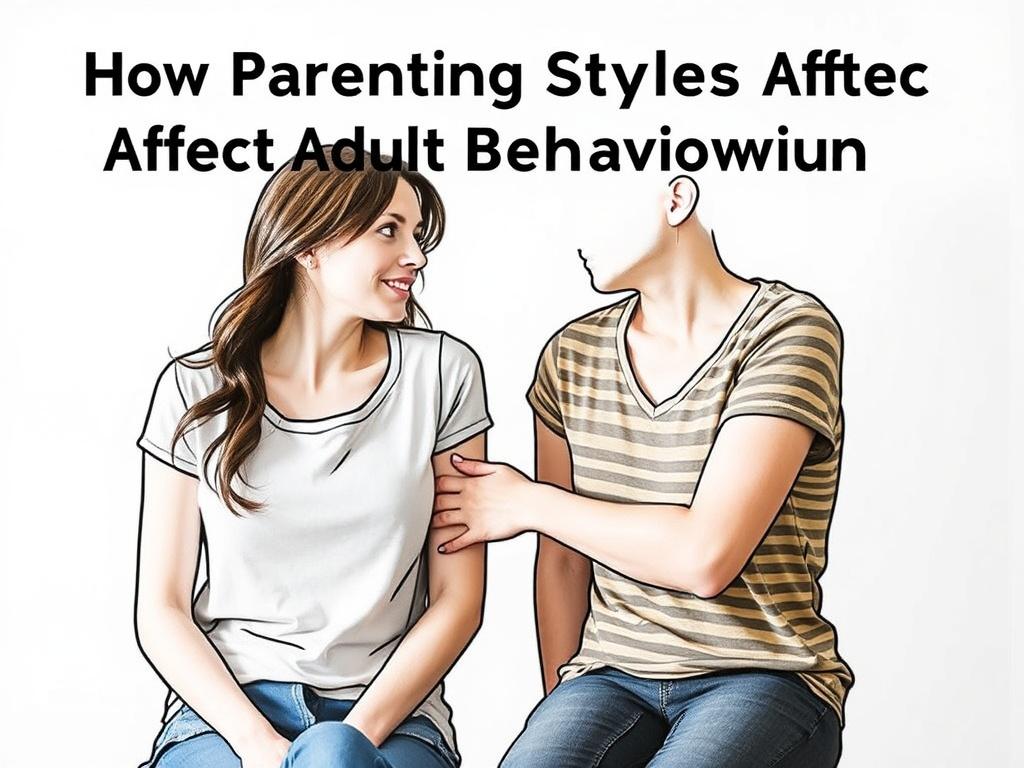Parenting is one of the most impactful roles a person can take on, shaping not just a child’s upbringing but their entire trajectory through life. The way parents interact with their children influences how those children develop emotionally, socially, and psychologically. When we talk about how parenting styles affect adult behavior, we’re tapping into a profound connection between the early environment and the adult self. It’s fascinating to realize that the patterns established during childhood, sometimes subtly and sometimes overtly, leave a lasting imprint that guides decisions, relationships, and self-perception well into adulthood.
For many people, the memories of discipline, encouragement, criticism, or support during their formative years create a blueprint for their adult behavior. The four classic parenting styles—authoritative, authoritarian, permissive, and neglectful—each bring with them a unique set of outcomes in adulthood. Understanding these styles helps us appreciate why people behave the way they do and how deeply our parents’ approaches influenced those behaviors. In this article, we will explore these parenting styles one by one, discuss the associated adult behaviors, and demonstrate how subtle differences in upbringing can lead to dramatic changes in adulthood.
The Four Primary Parenting Styles and Their Core Characteristics
At the heart of understanding how parenting styles affect adult behavior is recognizing the four broad categories psychologists have identified. Each style embodies a distinct blend of responsiveness (emotional warmth and support) and demandingness (expectations and discipline). These elements create a spectrum on which different parenting approaches fall.
| Parenting Style | Responsiveness (Warmth) | Demandingness (Control) | Key Characteristics |
|---|---|---|---|
| Authoritative | High | High | Balanced nurturing with clear rules, open communication |
| Authoritarian | Low | High | Strict rules, high expectations, little warmth or dialogue |
| Permissive | High | Low | Warm and indulgent, few demands or controls |
| Neglectful (Uninvolved) | Low | Low | Minimal involvement or warmth, few demands |
Each of these styles leaves distinct impressions on children, influencing behavior patterns, emotional health, and social skills later in life.
Authoritative Parenting: The Recipe for Balanced Adult Behavior

It is widely accepted by psychologists that authoritative parenting tends to produce the healthiest outcomes in terms of adult behavior. Parents who use this style maintain high expectations but also show warmth, provide explanations, and encourage independence. This combination nurtures self-confidence while ensuring children comprehend boundaries and responsibility.
Adults raised in authoritative households often demonstrate strong emotional regulation, high self-esteem, and social competence. They’ve typically internalized the importance of rules while feeling valued and understood, which primes them for better communication and problem-solving in adulthood. For instance, research links this style to adults who have well-rounded interpersonal relationships and an ability to handle stress effectively.
When you think about it, it makes a lot of sense. Imagine growing up where your parents listen to your perspective but also insist on certain rules for your growth. You learn to balance your freedom with responsibility because that was modeled for you consistently. This leads to adults who carry a secure sense of self and respect for both themselves and others.
Adult Behavior Traits Associated with Authoritative Parenting
- Strong communication skills
- Healthy emotional regulation
- High self-esteem and confidence
- Effective problem-solving abilities
- Balanced sense of autonomy and social responsibility
Authoritarian Parenting: Control and Its Consequences on Adult Behavior
On the opposite end, authoritarian parents emphasize obedience and discipline often at the expense of warmth and open communication. This “do as I say” approach can cultivate adults who respect rules but may struggle with self-expression or autonomy.
Adults who grew up under authoritarian parenting often display high levels of conformity and may have difficulty making decisions independently. Their behavior can be characterized by either rigid adherence to rules or, conversely, rebellious attitudes as a reaction against strict controls. They might find it challenging to manage emotions because the emotional climate during childhood might have been cold or punitive.
This style’s influence on adult behavior often manifests as anxiety around authority figures, lower self-confidence, and sometimes difficulty in forming healthy relationships. Without the balance of warmth and dialogue, children often grow into adults who feel unheard or incapable of fully trusting themselves.
Adult Behavior Traits Associated with Authoritarian Parenting
- High obedience, low independence
- Possible resentment or rebellion
- Difficulty with emotional regulation
- Lower self-esteem and confidence
- Challenges in forming open relationships
Permissive Parenting: Sweet Freedom and Its Complex Effects on Adults

Permissive parenting is characterized by high warmth but minimal demands. Parents may indulge their child’s desires, avoid confrontation, and place few boundaries or rules. This approach often stems from a desire to protect children from strict discipline but can result in challenging behavior patterns as children grow.
Adults who grew up with permissive parents tend to be confident and expressive since they were encouraged to explore freely. However, the lack of structure may lead to difficulty with self-discipline, impulsivity, and challenges in authority or work settings. Without clear boundaries during development, some adults may struggle to regulate their behavior or understand consequences fully.
On the upside, permissive parenting often nurtures creativity and individualism, but it’s a double-edged sword. Those raised with too few restrictions may face struggles with time management, prioritization, and delayed gratification in adult life.
Adult Behavior Traits Associated with Permissive Parenting
- High creativity and self-expression
- Impulsivity and poor self-discipline
- Difficulty respecting authority or rules
- Challenges in managing responsibilities
- Strong emotional warmth but occasional boundary issues
Neglectful Parenting: The Long Shadow on Adult Behavior
Neglectful—or uninvolved—parenting combines low responsiveness with low demandingness. Parents may be emotionally or physically absent, providing no guidance or support. This absence can be devastating to a child’s development.
The adult outcomes linked to neglectful parenting often include difficulty forming secure attachments and trust in relationships. Many adults who experienced neglect during childhood carry long-lasting feelings of rejection, low self-worth, and emotional detachment. They might struggle with independence because they were inadequately prepared to navigate life’s challenges and lacked positive role models for behavior.
These adults often display a spectrum of behaviors that may include substance abuse, difficulty with intimacy, or problems regulating emotions. The neglect experienced during childhood creates a stressful foundation that many have to work hard to overcome throughout their adult lives.
Adult Behavior Traits Associated with Neglectful Parenting
- Low self-esteem and feelings of rejection
- Difficulty forming trusting relationships
- Emotional detachment or volatility
- Higher risk of risky behaviors and substance abuse
- Challenges with independence and self-care
How Different Parenting Styles Shape Adult Relationships
It’s clear that parenting styles have a profound impact on adult behavior, but one of the most telling aspects is how adults relate to others. These early experiences with caregivers form the blueprints for adult friendships, romantic partnerships, and work interactions.
Here is a quick overview of how adult relationships tend to unfold based on early parenting experiences:
| Parenting Style | Adult Relationship Behavior |
|---|---|
| Authoritative | Healthy boundaries, open communication, mutual respect |
| Authoritarian | Power struggles, fear of conflict, difficulty with intimacy |
| Permissive | Emotionally expressive, sometimes boundary issues, sensitivity to criticism |
| Neglectful | Attachment difficulties, mistrust, emotional withdrawal or volatility |
Understanding these relational patterns helps not only individuals but also therapists, educators, and caregivers who aim to support healthier adult social functioning.
The Role of Culture and Environment in Parenting Styles
While it’s tempting to think of parenting styles as static categories, reality is far more complex. Cultural values, socioeconomic factors, and environmental stressors all shape how parents behave and what styles dominate.
For instance, authoritarian parenting might be more common or accepted in certain cultures that prioritize obedience and order. In contrast, permissive parenting might arise more in households influenced by modern Western values emphasizing freedom and individuality. Additionally, parents under economic or emotional stress may unintentionally lean towards neglectful behaviors due to exhaustion or overwhelm.
Therefore, when discussing how parenting styles affect adult behavior, it’s important to consider these contextual factors. They remind us that parenting is not just a set of fixed behaviors but a dynamic system influenced by many variables.
Examples of Cultural and Environmental Influences
- Collectivist Cultures: More authoritarian styles prevalent; emphasis on respect for authority
- Individualistic Cultures: Authoritative and permissive styles more common; focus on personal freedom
- Economic Stress: Can increase neglectful parenting due to lack of resources
- Parental Education: Often correlates with more authoritative practices
These examples illustrate why broad generalizations about parenting and adult outcomes should be approached with nuance and cultural sensitivity.
Can Adults Change Patterns Set by Their Childhood Parenting?

One of the most empowering insights from psychology is that although early parenting sets the foundation, adults are not doomed to repeat all patterns from their childhood. Awareness, therapy, and deliberate effort can break cycles of negative behavior.
Adults raised with authoritarian or neglectful parenting, for example, can learn healthier communication, emotional regulation, and self-compassion. Similarly, those from permissive backgrounds can cultivate better self-discipline and boundary setting. Even individuals from nurturing, authoritative homes sometimes need help navigating complexities in adult life, but they generally have a strong base from which to grow.
Practical Steps Adults Can Take to Overcome Negative Childhood Patterns
- Engage in therapy or counseling to unpack past experiences
- Practice mindfulness and emotional regulation techniques
- Learn and apply boundary-setting strategies in relationships
- Develop self-compassion and challenge negative self-beliefs
- Seek social support or mentoring networks
The beautiful reality is that parenting styles affect adult behavior, but they don’t define it entirely.
The Importance of Awareness for Future Parenting Generations
Reflecting on how parenting styles affect adult behavior offers more than insight into ourselves—it serves as a vital source of guidance for future parents. When people understand the long-term results of various parenting approaches, they’re better equipped to choose nurturing, balanced practices. The authoritative style, with its blend of warmth and structure, is often the ideal many strive toward because it supports resilience, emotional intelligence, and social skills.
Awareness also fosters compassion—a key ingredient in good parenting. Recognizing that no one is perfect, that many parents repeat patterns they experienced, and that stress and environment shape behavior creates empathy and a desire to improve.
Tips for Aspiring Parents Based on Research
| Parenting Practice | Benefit for Child’s Adult Development |
|---|---|
| Setting clear but fair boundaries | Teaches responsibility and self-control |
| Encouraging open communication | Builds emotional intelligence and trust |
| Offering warmth and support | Fosters self-esteem and security |
| Providing consistent discipline | Develops understanding of consequences |
| Modeling healthy behaviors | Creates a blueprint for positive adult relationships |
This knowledge equips parents to leave a positive legacy and nurture children who thrive emotionally and socially as adults.
Conclusion
In exploring how parenting styles affect adult behavior, we uncover a complex interplay between early childhood experiences and lifelong patterns. Each parenting style—authoritative, authoritarian, permissive, and neglectful—casts its own shadow on the adult personality, influencing emotional well-being, relationship building, self-esteem, and decision-making. Authoritative parenting emerges as the style most consistently linked to healthy, balanced adult behavior, offering a nurturing combination of warmth and structure that fosters resilience, autonomy, and empathy. Conversely, authoritarian, permissive, and neglectful approaches may predispose adults to challenges ranging from low self-confidence and emotional dysregulation to impulsivity or attachment difficulties. Yet, while early experiences are powerful, they are not immutable. Adults have remarkable capacity for change, growth, and healing, aided by self-awareness and intentional effort. Ultimately, understanding these dynamics opens doors not only for personal growth but for breaking cycles and raising healthier future generations. Parenting is not just about raising children—it shapes the adults they become, influencing the fabric of our society and the legacy we leave behind.




















